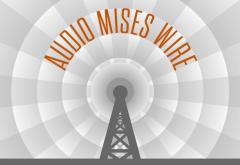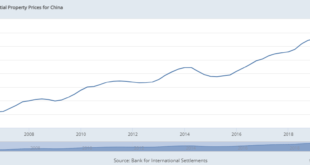Price inflation has been accelerating upward since April of last year. Yet the Fed has done virtually nothing. What’s the Fed waiting for? Original Article: “With Inflation at a 40-Year High, the Fed Is Too Afraid to Act” According to the Bureau of Labor Statistics (BLS), Consumer Price Index (CPI) inflation rose 7.5 percent in January, year over year. This was, the BLS notes, the “largest 12-month increase since the period ending February 1982.” Moreover, The...
Read More »Inflation: Who or What Is the Culprit?
Inflation—defined herein as a widespread increase in the prices of widely purchased consumer goods—has gotten worse since I commented on it last spring. According to the official Consumer Price Index (CPI), inflation is currently running at 7.5 percent year over year—the highest since 1982. What triggered the last year’s explosion in prices? President Joe Biden has tried to blame inflation on greedy corporations and supply-chain disruptions. The former is...
Read More »Behind Klaus Schwab, the World Economic Forum, and the Great Reset: Part 3
Bob continues his series on Klaus Schwab and the Great Reset, highlighting an interesting remark in Biden’s SOTU, Strobe Talbott’s open support for global government, and the introduction to Schwab’s book on Covid-19 and the Great Reset. Mentioned in the Episode and Other Links of Interest: Part 1 and Part 2 of this series The WEF’s bio for its founder, Klaus Schwab Schwab’s books The Fourth Industrial Revolution and Covid-19 and the Great Reset Bob’s first...
Read More »Why Sanctions Don’t Work, and Why They Mostly Hurt Ordinary People
The United States and its western European allies have in recent days repeatedly increased economic sanctions against not only the Russian regime, but against millions of ordinary Russians. It has done this by cutting much of Russian trade and Russian finance out of international markets. Moody’s and S&P global have both downgraded Russia’s credit rating. The US has frozen Russian reserves and cut many Russian banks off from SWIFT, the international banking...
Read More »Why Putin Probably Hasn’t Doomed the Dollar
In this episode of Radio Rothbard, Ryan McMaken and Tho Bishop look at the economic consequences of Russia’s invasion of Ukraine. What has been the damage from America’s weaponization of the dollar? Is Russia likely to return to the gold standard? What may be the fallout in Europe? Recommended Reading “Can Government Successfully Counter Recessions Through Expansionary Policies? Don’t Count on It” by Frank Shostak: Mises.org/RR_72_A “Sanctions against Russia Are...
Read More »Economic Aspects of the Pension Problem
On Whom Does the Incidence Fall? Whenever a law or labor union pressure burdens the employers with an additional expenditure for the benefit of the employees, people talk of “social gains.” The idea implied is that such benefits confer on the employees a boon beyond the salaries or wages paid to them and that they are receiving a grant which they would have missed in the absence of such a law or such a clause in the contract. It is assumed that the workers are...
Read More »What Would Mises Have Thought of “Special Economic Zones”?
SEZs are loopholes, and capitalism breathes through loopholes. But like all loopholes, they tend to benefit those who can afford to hire the lawyers who can identify said loopholes. Original Article: “What Would Mises Have Thought of “Special Economic Zones”?” This Audio Mises Wire is generously sponsored by Christopher Condon. Narrated by Michael Stack. [embedded content] You Might Also Like...
Read More »China Needs to Pop Its Property Bubble
The financial woes of the giant real estate developer Evergrande, which carries an estimated debt of $300 billion, have rekindled global fears that China’s property bubble is about to burst. Such predictions have occurred repeatedly in the past, in particular since 2010, and have been fueled by the rapid rise of property prices, construction volumes, and real estate debt. Today, many analysts fear that if the property bubble collapses, the impact on the real economy...
Read More »Ukraine’s Regime Is Now Kidnapping Fathers for Military “Service”
As the Ukraine regime has imposed martial law in the wake of the Russia invasion, it has also apparently imposed a new near-universal conscription order. USA Today reports: The Ukraine State Border Guard Service has announced that men ages 18 to 60 are prohibited from leaving the country, according to reports. “In particular, it is forbidden for men aged 18–60, Ukraine citizens, to leave the borders of Ukraine,” a statement from the service said, according to CNN....
Read More »Canada’s Freezing of Protesters’ Finances Shows How the “War on Cash” Ends.
The Canadian government is now freezing the bank accounts and personal assets of those who donated to support the Freedom Convoy, which is an organized political protest of the vaccine mandates. The deputy prime minister announced that they will retain these so-called emergency powers permanently going forward and will also seek to implement additional measures to further restrict the ability of political protestors to raise funds or otherwise use the banking...
Read More » Swiss Economicblogs.org
Swiss Economicblogs.org









